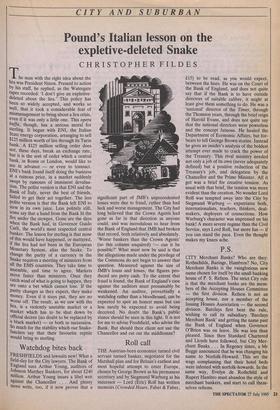Roll call
THE Austrian-born economist turned civil servant turned banker, negotiator for the Marshall plan and for Britain's earliest and most hopeful attempt to enter Europe, chosen by George Brown as his permanent secretary and by Siegmund Warburg as his successor — Lord (Eric) Roll has written memoirs (Crowded Hours, Faber & Faber, £15) to be read, as you would expect, between the lines. He was on the Court of the Bank of England, and does not quite say that if the Bank is to have outside directors of suitable calibre, it might at least give them something to do. He was a 'national' director of the Times, through the Thomson years, through the brief reign of Harold Evans, and does not quite say that the national directors were powerless and the concept fatuous. He healed the Department of Economic Affairs, but for- bears to tell George Brown stories. Instead he gives an insider's analysis of the boldest attempt ever made to crack the power of the Treasury. This rival ministry needed not only a job of its own (never adequately defined) but a positive reduction of the Treasury's job, and delegation by the Chancellor and the Prime Minister. All it got was a brief for creative tension. As usual with that brief, the tension was more evident than the creation. No wonder Lord Roll was tempted away into the City by Siegmund Warburg — expatriates both, internationalists, teachers, thinkers, deal- makers, deployers of connections. How Warburg's character was impressed on his bank! A more severe regime than the Civil Service, says Lord Roll, but more fun — if you can stand the pace. Even the thought makes my knees ache.














































 Previous page
Previous page